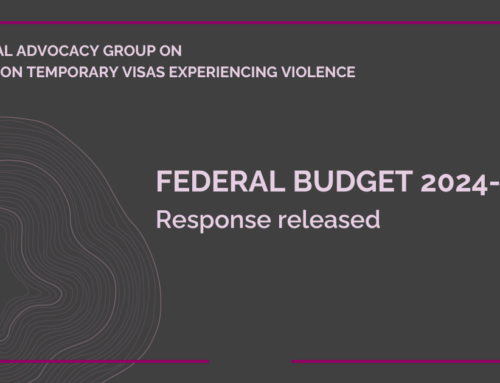Following last Tuesday’s budget announcement, there is a growing consensus that the federal budget needs fundamental change. Seventeen organisations have come together to call for a new approach to budgeting which will bring women’s needs into sharper focus.
“The Minister for Women, Marise Payne, has made it clear that she understands that women will play a vital role in this recovery and the measures outlined in the Women’s Economic Security Statement are a strong first step in that direction,” said Helen Dalley-Fisher, Senior Manager of the Equality Rights Alliance. “It’s therefore concerning that the rest of the budget failed to address the key structural issues facing women. It’s become clear that the budget process itself is one of the barriers we have to address.”
The job of confronting the bias in the budget has been made a little easier by a recognition of the need for more robust data about women’s lives. “It was pleasing to see that there will be a revision and enhancement of the ABS’ Gender Indicators report,‘ said Trish Bergin of the 50/50 by 2030 Foundation. ‘Gender relevant data is essential as a building block towards understanding the gender impact of both current and prospective policy changes”.
However, despite widespread calls for investment in social housing from economists, housing specialists and women’s groups, the budget didn’t address Australia’s dire lack of affordable housing. “We have known for years that Australia is experiencing a housing affordability crisis, with older women the fastest growing group experiencing homelessness,” said Emma Davidson of the Women’s Electoral Lobby. “Building more social housing would help with the rising tide of homelessness, while also creating jobs.”
Another area which needed but failed to get urgent attention in this budget was childcare. Chief Executive Women President, Sue Morphet, said “Increasing female full-time workforce participation is one of Australia’s biggest economic opportunities; and making early childhood education and care more affordable is one of the most effective policy levers to do that. This is not welfare; it is investment in the infrastructure women need to participate more fully in the workforce and maximise their productivity and opportunities.”
“With soaring rates of all forms of violence against women and their children, it is vital that we fund long-term solutions and building a future free from violence for people in Australia” said Tina Dixson, Acting Program Manager of the Australian Women Against Violence Alliance. “The COVID-19 pandemic has not only increased the prevalence of violence but created additional barriers for women to seek safety. Without gender responsive budgeting and commitment to ending violence against women we risk losing lives”.
The Aid budget saw a slight increase for gender equality initiatives but at just 32 per cent of overseas development assistance it falls far short of what’s needed. “Women worldwide are experiencing the worst impacts of the economic and health crises brought on by COVID-19, yet the Government continues to make cuts to the Aid budget in regions where women face persistent gender inequality, alongside the growing impacts of the pandemic,” said Michelle Higelin, Executive Director of global women’s rights organisation ActionAid Australia. “At a time when gender equality is deteriorating worldwide at an alarming pace, Australia’s leadership is vital to address the disproportionate impact this pandemic is having on women and support women leading local responses.”
“It’s time for us to join the majority of nations in the OECD and work towards a budget that is truly gender responsive,” said Helen Dalley-Fisher. “We need a budget and policy process that makes it possible for policy makers to see and address the needs of women.”
For media comment or speakers for interview, please contact:
Helen Dalley-Fisher, Equality Rights Alliance – Senior Manager on 0413 065 822 or [email protected].
Emma Davidson – Women’s Electoral Lobby on 0459 901 306
Tina Dixson – AWAVA on 0428 541 396 or [email protected]

